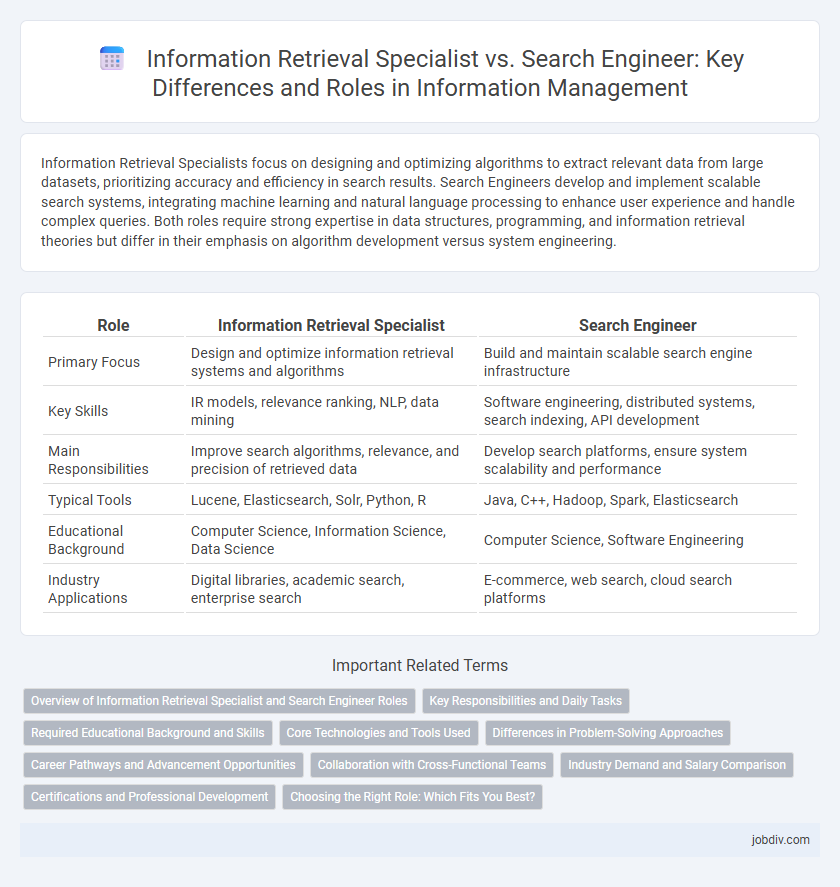Information Retrieval Specialists focus on designing and optimizing algorithms to extract relevant data from large datasets, prioritizing accuracy and efficiency in search results. Search Engineers develop and implement scalable search systems, integrating machine learning and natural language processing to enhance user experience and handle complex queries. Both roles require strong expertise in data structures, programming, and information retrieval theories but differ in their emphasis on algorithm development versus system engineering.
Table of Comparison
| Role | Information Retrieval Specialist | Search Engineer |
|---|---|---|
| Primary Focus | Design and optimize information retrieval systems and algorithms | Build and maintain scalable search engine infrastructure |
| Key Skills | IR models, relevance ranking, NLP, data mining | Software engineering, distributed systems, search indexing, API development |
| Main Responsibilities | Improve search algorithms, relevance, and precision of retrieved data | Develop search platforms, ensure system scalability and performance |
| Typical Tools | Lucene, Elasticsearch, Solr, Python, R | Java, C++, Hadoop, Spark, Elasticsearch |
| Educational Background | Computer Science, Information Science, Data Science | Computer Science, Software Engineering |
| Industry Applications | Digital libraries, academic search, enterprise search | E-commerce, web search, cloud search platforms |
Overview of Information Retrieval Specialist and Search Engineer Roles
Information Retrieval Specialists focus on designing and optimizing systems that collect, index, and retrieve relevant documents from large datasets, emphasizing algorithms and user query understanding. Search Engineers develop and maintain search engine infrastructure, integrating advanced ranking models and scalable architectures to enhance speed and accuracy. Both roles require expertise in natural language processing, machine learning, and data structures but differ in their technical scope and application focus.
Key Responsibilities and Daily Tasks
Information Retrieval Specialists focus on developing algorithms to enhance the accuracy and efficiency of search systems by analyzing user queries and refining indexing methods. Search Engineers design and implement scalable search architectures, optimize search engine performance, and integrate new features based on data-driven insights. Both roles require expertise in machine learning, natural language processing, and handling large datasets to improve search relevance and user experience.
Required Educational Background and Skills
Information Retrieval Specialists typically require a degree in computer science, information science, or related fields, with strong expertise in information retrieval theories, natural language processing, and data mining. Search Engineers often hold degrees in computer science or software engineering, emphasizing skills in software development, search algorithm design, and machine learning. Both roles demand proficiency in programming languages such as Python or Java, knowledge of indexing, and statistical analysis to optimize search systems effectively.
Core Technologies and Tools Used
Information Retrieval Specialists primarily utilize natural language processing (NLP), machine learning algorithms, and indexing frameworks such as Apache Lucene and Elasticsearch to optimize search accuracy and relevance. Search Engineers focus on scalable system design, distributed computing platforms like Hadoop and Spark, and custom search engine development to enhance performance and handle large-scale data processing. Both roles leverage query optimization, data mining, and analytics tools but differ in emphasis on algorithm refinement versus infrastructure engineering.
Differences in Problem-Solving Approaches
Information Retrieval Specialists focus on optimizing the accuracy and relevance of search results by refining algorithms that understand user queries and content semantics. Search Engineers build scalable search infrastructures and develop efficient indexing techniques to handle large-scale data retrieval systems. The primary difference lies in the specialist's emphasis on relevance and user intent, while engineers prioritize system architecture and performance optimization.
Career Pathways and Advancement Opportunities
Information Retrieval Specialists often begin their careers with roles in data analysis or library science, advancing through expertise in metadata, indexing, and query optimization to senior positions in information management. Search Engineers typically start with software development or data engineering backgrounds, progressing by mastering search algorithms, machine learning, and system scalability to lead roles in search technology and product development. Both career paths offer advancement opportunities in research, technical leadership, and cross-functional collaboration within AI and big data domains.
Collaboration with Cross-Functional Teams
Information Retrieval Specialists collaborate with data scientists and software developers to enhance algorithm accuracy and relevance in search results. Search Engineers work closely with product managers and UX designers to implement scalable search infrastructures and optimize user experience. Both roles require continuous cross-functional communication to align technical solutions with business goals.
Industry Demand and Salary Comparison
Information Retrieval Specialists typically focus on optimizing algorithms to improve the accuracy and relevance of search results across various industries, with an average salary ranging from $85,000 to $120,000 annually. Search Engineers design and implement scalable search engine infrastructures, often commanding higher salaries between $100,000 and $140,000 due to their expertise in software engineering and system architecture. Industry demand for both roles is robust in technology, e-commerce, and data-driven sectors, but Search Engineers generally experience greater demand in companies prioritizing large-scale search solutions and advanced user experience.
Certifications and Professional Development
Information Retrieval Specialists typically benefit from certifications such as Certified Information Professional (CIP) and specialized courses in data indexing and query optimization, enhancing their expertise in managing and retrieving data efficiently. Search Engineers often pursue professional development through certifications like Google Cloud Professional Data Engineer and machine learning specializations, focusing on building and optimizing search algorithms and infrastructure. Both roles emphasize continuous learning in areas like natural language processing, database management, and advanced search technologies to stay current with evolving information retrieval challenges.
Choosing the Right Role: Which Fits You Best?
An Information Retrieval Specialist focuses on improving algorithms and systems that accurately retrieve relevant data from large datasets, emphasizing relevance ranking and user query understanding. A Search Engineer designs and implements scalable search infrastructures, optimizing performance and integrating search functionalities across platforms. Choose the role based on your strength in algorithm development and user intent analysis for Information Retrieval Specialist, or system architecture and engineering skills for Search Engineer.
Information Retrieval Specialist vs Search Engineer Infographic

 jobdiv.com
jobdiv.com